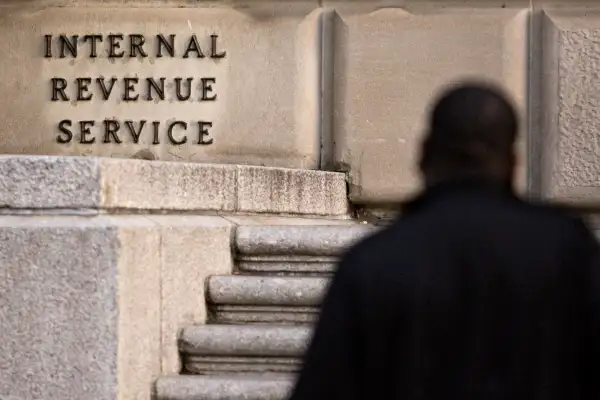The IRS Is Cracking Down On Cryptocurrency Transactions. Here's What That Means For You
Money is not a client of any investment adviser featured on this page. The information provided on this page is for educational purposes only and is not intended as investment advice. Money does not offer advisory services.

Investors aren't the only ones interested in big cryptocurrency profits.
The IRS has a growing curiosity about them too.
And that could spell trouble for cryptocurrency investors who made out like bandits in 2017, when Bitcoin and altcoins enjoyed a break-out year.
Recently, the popular cryptocurrency exchange Coinbase capitulated to the IRS and the courts and announced that it would send requested transaction information on approximately 13,000 of its users. This is to comply with a court order issued in November.
“Coinbase fought this summons in court in an effort to protect its customers, and the industry as a whole, from unwarranted intrusions from the government,” the company wrote in its announcement to customers.
For Coinbase, this move represents the latest in a string of bad news for the exchange. A few weeks ago, a number of users expressed their frustration after the exchange inadvertently charged them multiple times for past purchases. Then last week, competitor Circle bought the exchange Poloniex, in an effort to compete with Coinbase’s scale.
But for cryptocurrency investors, this may be even worse news, as the IRS's victory represents the latest blow to the perceived independence of cryptocurrencies, which are in the crosshairs of a growing number of regulators around the world.
Few Taxpayers are Reporting Their Cryptocurrency Gains
Last year, the 10 best-performing cryptocurrencies posted average price gains of 14,000%, versus the 20% returns for the stock market.
Yet few taxpayers appear to be reporting their crypto trades.
Last month, Credit Karma said that of the more than 250,000 people who've already turned in their 2017 taxes via Credit Karma's filing service, fewer than 100 reported any cryptocurrency transactions. That's less than 0.04%.
To be sure, one of the big reasons why many investors dabble in cryptocurrencies in the first place is to avoid government regulations and intrusions. So you wouldn't expect cryptocurrency investors to be that forthcoming.
However, they may not have much of a choice going forward, as the IRS appears more aggressive in ferreting out crypto capital gains.
What the Coinbase Decision Means
Coinbase said it will provide taxpayer IDs, names, and cryptocurrency transaction records for traders who initiated transactions of $20,000 or more on the exchange between 2013 and 2015.
“That only 800 to 900 taxpayers reported gains related to Bitcoin in each of the relevant years and that more than 14,000 Coinbase users have either bought, sold, sent or received at least $20,000 worth of bitcoin in a given year suggests that many Coinbase users may not be reporting their bitcoin gains," Judge Jacqueline Scott Corley wrote in November, when detailing her ruling in favor of the IRS.
It’s also another jab at the faulty notion that investing in Bitcoin and altcoins is completely anonymous.
Because the virtual coins are tracked on digital ledgers, every single transaction is marked and stored. And more regulators have begun to crack down on cryptos’ libertarian dreams.
The Tax Implications of Investing in Cryptocurrencies
Coinbase's announcement should serve as reminder of how the IRS treats cryptocurrencies.
Investments in Bitcoin and altcoins are treated as property, not cash. So if you sell your virtual coins at a profit, you face capital gains taxes. And if you sell cryptocurrencies that you've held for less than a year, your capital gains are considered short term in nature, which means they will be taxed as ordinary income.
What this means is, you must outline every single cryptocurrency transaction you make and report it to the IRS. That’s true whether you are trading the cryptos as investments or spending them to buy a pack of gum or redesigning your home.
As Money detailed in November, if you purchase a $3,500 bedroom set using a portion of a bitcoin you bought in 2016 for $200, then the gain is $3,300. That would be taxed at a 15% long-term capital gains rate, leading to a $495 tax hit.
If you spend coins that you’ve held for less one year, however, then it’s treated as short-term gains, and taxed at regular income rates, which reach as high as 39.6% for the 2017 tax year.
